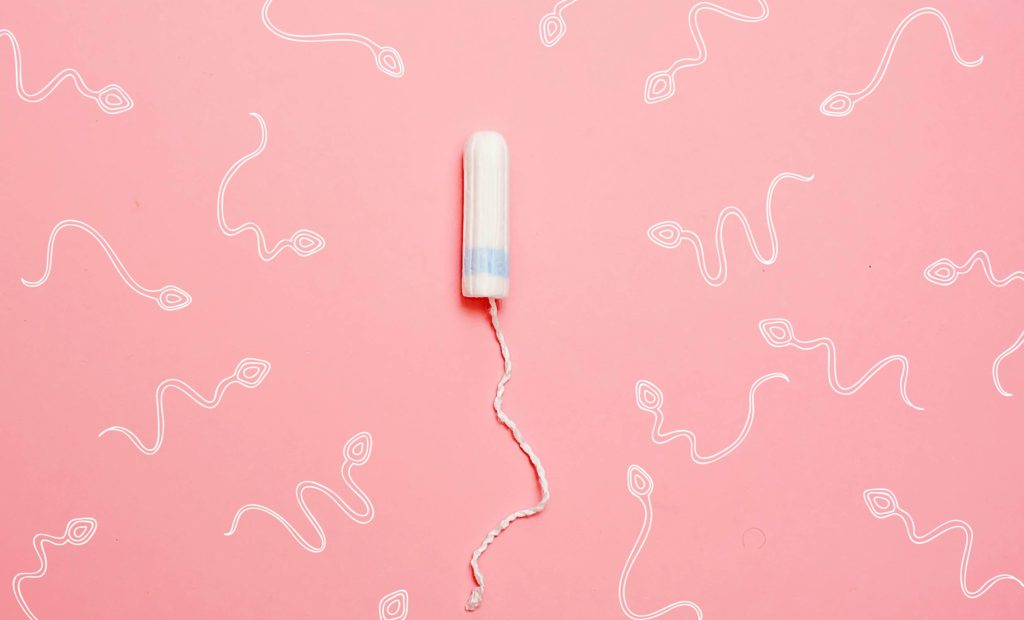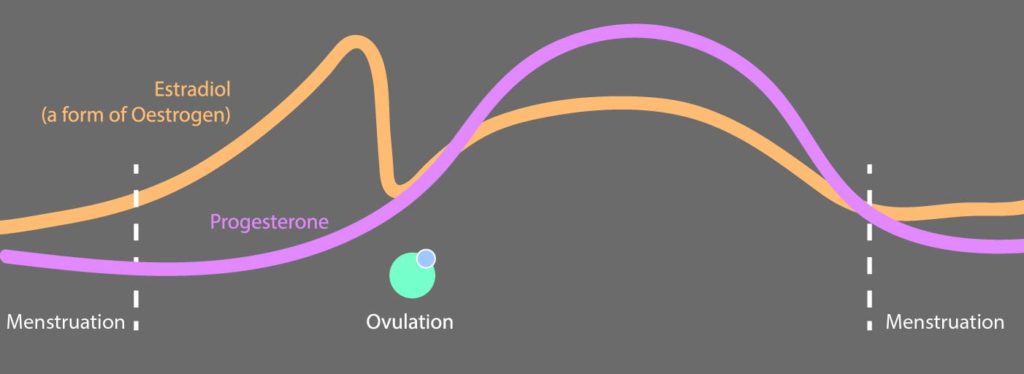The short answer is a resounding YES: You can become pregnant after engaging in sexual intercourse while menstruating.
If you’re curious like me, you’ll want to know why (read on for the details).
And before we get started, it is possible to enjoy period sex without fallling pregnant. I teach all about this in the Natural Contraception video courses and coaching. My clients confidently confirm when they’ve passed ovulation, and identify if they’re having a true period. They also accurately track mucus so that they don’t get surprised with an early ovulation! 👀

We are only fertile for 48 hours every menstrual cycle; however, it takes two to tango and we need to take into account the lifespan of sperm. Sperm can survive up to 5-7 days in the reproductive tract thanks to the incredible properties of cervical mucus. (Not sure what cervical mucus is? Take a read of THIS article).
With the lifespan of the sperm and egg combined, there is a “fertile window” each menstrual cycle of approximately 6-9 days where intercourse could result in pregnancy.
This fertile window can occur earlier or later in your cycle, depending on when you ovulate. A rule of thumb is that ovulation always occurs 10-16 days prior to the start of your next period. These 10-16 days are known as the luteal phase.
There are a few scenarios where the fertile window can land on times of your cycle where you are experiencing bleeding, so let’s take a look!

SHORT CYCLES:
If you regularly have short menstrual cycles, this means your fertile window occurs much earlier than the average. Due to this, period sex can very easily result in sperm sitting ready and waiting in your fallopian tubes just in time for the egg to be released! (This would be especially true if you experience quite a long period in combination with a short cycle). To provide an example, if you have a 23 day cycle, ovulation could be happening around day 9 (23 minus a 14 day luteal phase = 9). If ovulation is occurring on day 9, we then need to take into account the lifespan of sperm (up to 7 days), which takes us back to day 3 of the menstrual cycle as the opening of the fertile window – and it’s highly likely that you will still be menstruating on day 3. It’s important to note that the above are general figures and not necessarily applicable to your individual menstrual cycle.

UNEXPECTEDLY EARLY OVULATION:
If you’re reading this and thinking, ‘phew, I’m safe! I don’t have short cycles – I have average length cycles!” then I have bad news for you. As all Fertility Awareness Educators would say: “never predict future cycles based on past cycles“. The process of ovulation can often be delayed or brought forward seemingly randomly or even due to influences such as new supplements, different exercise regimens, new diets, illness, travel, stress, medication and more. So even if you consistently have 28 day cycles, there is no reason that ovulation cannot occur unusually early for you one day – and if this does happen after you’ve had unprotected sex during the last few days of your period, there is a chance that pregnancy may occur. This risk is even higher if you experience very long periods (say 7 to 8 days).

NON-MENSTRUAL BLEEDING:
The definition of a true period, is bleeding that follows 10-16 days after ovulation as the uterine lining sheds. Bleeding that was not preceded 10-16 days prior by ovulation, is known as non-menstrual bleeding.
Did you know that there is no guarantee that you will ovulate during each and every menstrual cycle? In fact, there is research to show that during our reproductive years, ovulation may not occur in an average of around 7% of menstrual cycles*. These figures are higher during the teen and pre-menopausal years.
Why is this so important? Because you could get a “period” at the end of a seemingly normal 28 day cycle, not realising that you never even ovulated and what you are experiencing is non-menstrual bleeding. Your ovaries may then gear up to finally ovulate successfully – just after you’ve had unprotected sex on days 1 or 2 of what you assumed was a true period!
Non-menstrual bleeding can also be common for people with polycystic ovarian syndrome who may go many months before their body successfully ovulates. This can lead to a build-up of the uterine lining. This thick lining can become unstable without the progesterone we would usually regularly release after ovulation. The destabilised lining can break down and cause bleeding that might be mistaken for a true period if you are not tracking your menstrual cycle.
*Researchers often refer to “non-ovulatory or anovulatory menstrual cycles” but this is a misnomer, because without the event of ovulation, the menstrual cycle cannot complete (because once ovulation occurs, menstruation will follow within 10-16 days, thus completing the full menstrual cycle).

OVULATION-SPOTTING:
Spotting or light bleeding around the time of ovulation is another type of non-menstrual bleeding. The reason that this occurs is hypothesised to be due to large fluctuations in hormone levels as you experience a peak of oestrogen which quickly falls, potentially leading to a small oestrogen-withdrawal spotting event. If you’re not tracking your cycles, this light bleeding could be mistaken for a light period – and if you were under the illusion that period sex was “safe” then you would have made the mistake of having unprotected intercourse right on the most fertile days of your cycle!
So, the next time you put a towel down to enjoy the benefits of period sex (like cramp and migraine relief), don’t forget to use protection!*
*If you’re wondering whether there’s a way to tell whether you’re ovulating each month, differentiate between all these different types of bleeding, and preempt an early ovulation as best as possible – you’ll want to dive deep into the Symptothermal Method of Fertility Awareness. You can ENJOY sex without fear of pregnancy with the Natural Contraception video course and coaching.




